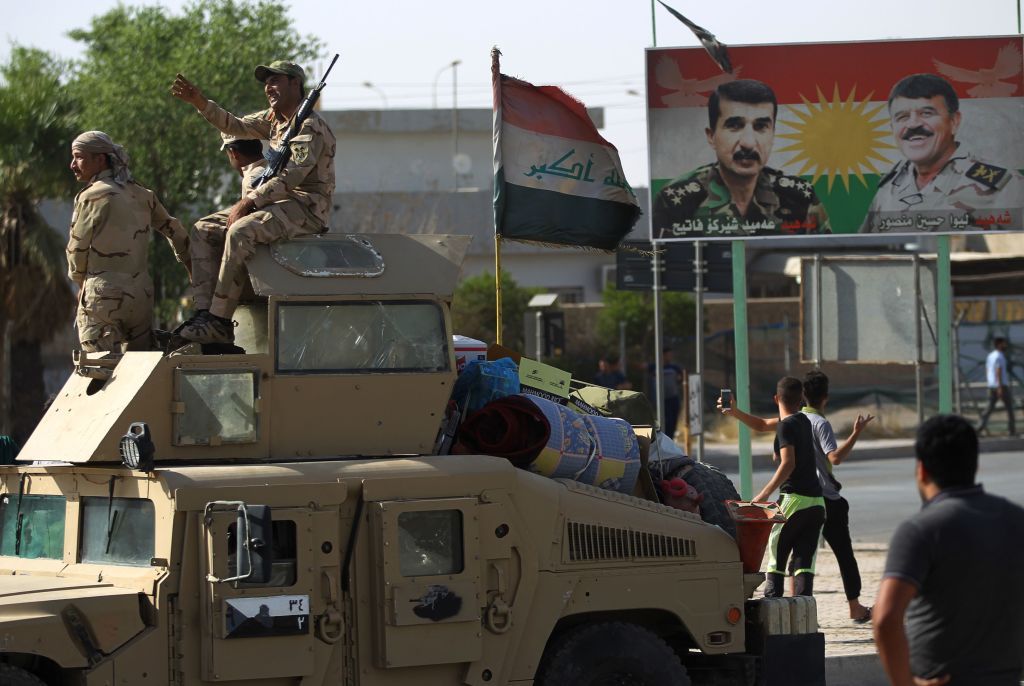
After a frenetic 24 hours the U.S.-led coalition against the Islamic State militant group (ISIS) in Iraq looks to be on the verge of collapse with the Iraqi military, backed by local militias, swooping in on positions held by the country's autonomous Kurdish forces.
But as Baghdad gains the upper hand over the Kurdish forces—both sides are equipped and backed by the United States—it is Iran, identified by President Donald Trump in recent weeks as the principal disruptor of stability in the Middle East, that has gained the most.
The Kurdish military has condemned the attack as a declaration of war, claiming the assaults were orchestrated by Iran's Islamic Revolutionary Guard Corps through its international special forces, the al-Quds brigade. "In spite of the plot by Iraq's government and Iran's al-Quds force, [Kurdish forces] will bravely defend the people of Kurdistan," the autonomous region's general command said in a statement today.
Following the shock loss yesterday of Kirkuk by the Peshmerga, Iraqi Kurdistan's military forces, local Yazidi fighters with Iranian-backed Shiite militias captured the town of Sinjar. The commander of the Yazidi forces, Masloum Shingal, told the Associated Press the town was taken without a fight.
Sinjar, like Kirkuk, was captured by the Peshmerga when the Iraqi military evaporated in the face of the advance by ISIS into Iraq from Syria in the summer of 2014. The mountainous area, recaptured by the Kurds in 2015, was where ISIS carried out some of its worst atrocities against the local Yazidi population. The United Nations has called the group's systematic campaign of extermination and subjugation against the religious minority a genocide.
The U.S. has provided air support to federal and Kurdish forces in Iraq in the battle against ISIS. However, tensions have come to a head in Kirkuk after Baghdad declared a Kurdish referendum on indenpendence in September unconstitutional.
Ninety three percent of those who voted in the poll said they backed independence for Iraqi Kurdistan. In excess of 3.3 million people voted in the ballot, roughly 72 percent of eligible voters. Kurdish authorities rejected Baghdad's demands they should throw out the the result as a precusror to dialogue. Among the central government's greivences were complaints voting had taken place in areas outside the Kurdish autonomous region including in Kirkuk.
Kirkuk, which is ethnically mixed but lies outside the territory of the Kurdish government, has been a key point of disagreement between Baghdad and the Kurds. The city sits on the edge of large oil fields capable of producing some 500,000 barrels of oil per day.
The return of the city to the federal government's sphere of control is a victory for Baghdad, where Iran wields increasing influence. Tehran has been the principal backer of mainly Shiite Popular Mobilisation Forces, formed by civilians to fight the Islamic State and now formally absorbed into the Iraqi military.
Similarly officials with strong ties to Iran have ascended to critical positions of power in Iraq. The country's interior minister Qasim al-Araji, whose militarized police have formed the vanguard in the fight against ISIS, spent years in exile in Iran, travelling to the Islamic Republic as a teenager in the 1980s. While there he was trained as a guerilla commander by Iran's shadowy al-Quds force.
The United States has said it will not take sides in the dispute between its two Iraqi allies, and attempted to downplay the clashes. "We don't like the fact that they're clashing. We're not taking sides," Trump told reporters at the White House yesterday.
"We've had for many years a very good relationship with the Kurds as you know and we've also been on the side of Iraq, even though we should have never been there in the first place. We should never have been there. But we're not taking sides in that battle," he added.
Uncommon Knowledge
Newsweek is committed to challenging conventional wisdom and finding connections in the search for common ground.
Newsweek is committed to challenging conventional wisdom and finding connections in the search for common ground.
About the writer
Callum Paton is a staff writer at Newsweek specializing in North Africa and the Middle East. He has worked freelance ... Read more
To read how Newsweek uses AI as a newsroom tool, Click here.








